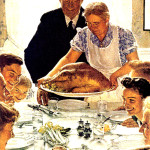Fourteen people sat at the long rectangular table in the private dining room that included one wall made entirely out of glass. The meet-and-greet-while-standing portion of the night lasted as long as it took the company President and his Director of Operations to secure seating arrangements, for each one of the seven company members brought his or her spouse—marking the first time for such a gathering—and seating arrangements could make a difference in how well the evening unfolded. During a lull in the conversations or while glancing through the menu, because I sat facing the glass wall, I watched waiters and waitresses moving throughout the restaurant, patrons enjoying their drinks and food, and sports highlights playing on the television screen that hung over the restaurant bar. A shift in focus, though, and I could also see our own room and all fourteen people gathered for the evening reflected in the glass wall.
The reflection looked like a vintage motion picture, only without those stilted movements. Each person talked or listened, hands gesturing to amplify their words or reactions or to bring drinks to their mouths. If a conversation on the other side of the table got animated, I could hear some of what was being said but not enough to be in on their talk. I watched briefly, though, because I had a seat next to my wife and across from the firm’s newest hire and his wife, and the conversation among us proved entertaining, even insightful. All the while, too, I glanced at the glass wall that played the motion picture of everyone gathered for dinner in that room. Ambrosial food for all in attendance spurred us out, despite a drive of over an hour on a cold night, multiple baby-sitters, and a school-day to follow.
The firm’s President stood up to officially welcome everyone and make a speech. He first mentioned needing an event like this to build upon the company’s good morale. What he said later, though, brought the reflection of everyone in the glass wall back to my mind, this time overlaid with a theme worthy of contemplation.
He discussed the milestone the small business hit that year. But the bulk of his talk involved a bio for each of his team members, starting with the Director of Operations, who’d been with the firm since 2018. And with each team member, the President explained how he met them, what skills they contributed to the firm, and why he asked them to be part of his team. (He had a few remarks for each team member’s spouse, too.) From Erin to Tim to Becky to John to Brandon to Zach—the President requested each member be part of his team because they not only met a need the company had but gave him the impression that they were people of character. Next to trusting someone with our own lives or our own children, trusting someone with our money sits high atop the Mountain of Trust. That the President and his team are skillful and good has made them a trusted business. I am glad that my wife is counted among such people.
Then the President said a few words about his entrance into the industry of financial advising. His first industry job was with a large firm in Roanoke, Virginia. His cubicle was one of several other cubicles on the building’s fifth floor. The place felt unimaginative, corporate in a way that seemed removed from the human element of money management. Adding to this sadness, his office space had no window. “When I realized there was no window for my office, I committed myself to do whatever it took to get an office with a window,” he said. “That was my first thought.”
Readers of Front Porch Republic are steeped in the work of Wendell Berry enough to know how much “The Membership” matters. Each of Berry’s fictional stories tends to follow one character, such as in A World Lost or Jayber Crow or Hannah Coulter, but those singular characters are or become aware that they aren’t the only ones in the world. Each one belongs in a “membership” and, consequently, owes his or her flourishing to both personal efforts as well as to key figures in their lives. Berry sets his stories in rural Kentucky, where mostly farmers and the land occupy the narratives; however, in all three of the titles mentioned earlier, financial concerns abound. Much has been said elsewhere about the economic hardships that attend farming. Much has been said elsewhere about finances in general. Anyone raising a family or running a school or leading a church or producing a film or building a company knows the weight of money. While money is a terrible god to serve, it is a resource needing stewarded. Berry’s fiction attests to this. His characters reveal so much in their stories, and they often voice gratitude for those good people who’ve provided help, with money and with so many other human needs, throughout their lives. Many of Berry’s characters, too, have a desire to also be good themselves. They don’t expect to surround themselves with virtuous people while they themselves remain crooked. There abides a sharpening of iron with iron. Deep calling to deep.
When the company President made his remarks about an office with a window, the reflection of everyone in the glass wall of the dining room came into my focus, accompanied with this thought: setting out to get an office with a window view, the firm’s President gathered unto himself a team of virtuous people. It was quite the thing to behold.
Image Via: Flickr





